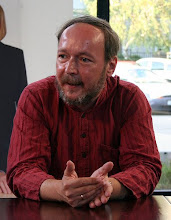 One of the most important outcomes of the first day of the National User Workshop was that the care giver group (who attended the first day of the three day event) understood and expressed that care givers' perspectives and interests are not the same as users' interests and perspective.
One of the most important outcomes of the first day of the National User Workshop was that the care giver group (who attended the first day of the three day event) understood and expressed that care givers' perspectives and interests are not the same as users' interests and perspective.This discovery came up as part of an interactive group session, in which participants were asked to consider everyday situations and decide whether that was something they would have liked for themselves or not. Then the groups were asked to deliberate on wether the situations they would prefer for themselves is typically present and accessible for users of psychiatry in India. If not, why not? Similarly: are the situations participants saw as undesirable typically part of users' life? If yes, why?
Life situations elaborated upon in the session included:
- People help you in ways you don't like.
- Being able to decide about your holiday programme.
- People don't believe what you are telling them.
- Doctor talking about your health to your relatives not even looking at you while you are there.
- Your opinion about a service is regularly sought for.
Some participants had more than one identity: they were both carers and users themselves. It was interesting to see and reflect on how these identities interacted in the same persons' minds. A young psychiatrist came to the workshop as a care giver, then understood that his user identity was stronger and continued his participation and valuable contribution on the following two days.


No comments:
Post a Comment